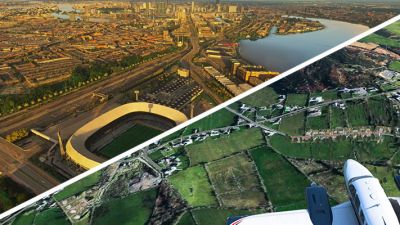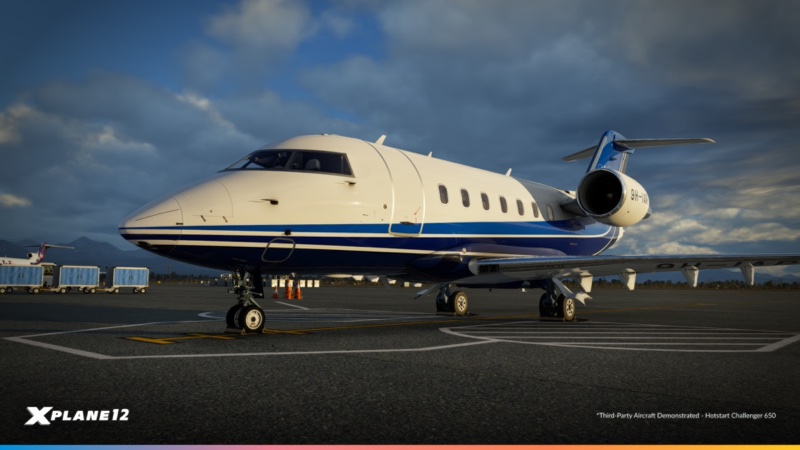
X-Plane 12 vs Microsoft Flight Simulator: A Detailed Comparison
Dive into a broad comparison of X-Plane 12 and Microsoft Flight Simulator, scrutinizing refined flight physics, newly enhanced scenery…

X-Plane 12.2.0 Beta focuses heavily on cockpit lighting, exposure balancing, and refined sky simulation, addressing longstanding visual issues with new or improved rendering algorithms. VRAM management sees significant updates, along with an overhaul of clouds, exposures, and color science for more realistic immersion. Airports also gain higher-resolution surfaces, weather effects on roads, and vital ATC and aircraft system enhancements for an even richer flight simulation experience.
If you have felt that illuminated panels and instrument readability were lacking in earlier iterations, then this latest beta offers a dramatic turnaround. Laminar Research calls X-Plane 12.2.0 “the update you’ve been waiting for,” and it’s easy to see why. There’s a significant focus on balancing cockpit exposure, refining ambient light, and overhauling the simulation of skies and clouds. After more than a year of development, this update aims to address longstanding visual concerns with a host of new or improved algorithms and features. Below are the core highlights, along with technical insights that truly set this release apart.
A common complaint from many virtual pilots revolved around underexposed cockpits. In this new release, the rendering engine distinguishes shadows and window influences with greater nuance. You might notice more realistic color inside your aircraft during early mornings or late evenings. The environment beyond the windshield will appear properly illuminated without your cockpit becoming a dim cave.
Borrowed from modern photography, exposure fusion combines multiple levels of brightness into one scene, so the eye registers the perfect balance of light and dark. In practice, this means you won’t be blinded by bright clouds outside while interior instruments remain faint. Both cockpit panels and outside scenery receive proportionate treatment, making it much easier to switch focus from the flight deck to the horizon.
Laminar found that the sky was more than twice as bright as it should have been, which clipped the interior brightness in previous builds. The skies have now been recalibrated to better reflect reality, helping the overall lighting stay within more natural limits. This adjustment complements the fusion approach and keeps that perfect contrast.
Efficient use of video memory can make or break frame rates in flight simulators. In version 12.2.0, VRAM allocation is orchestrated in smaller blocks, giving the graphics pipeline more opportunities to free up resources when needed. This fluid approach means your system is less prone to stutters or texture pop-ins, improving smoothness whether you’re taxiing at a large airport or navigating dense cloud cover.
Nighttime approaches and large airfields traditionally place heavy loads on GPUs. By splitting lighting tasks into manageable data chunks or “tiles,” X-Plane can more efficiently distribute the rendering load. This technique ensures that the simulator not only looks fantastic after sunset but also runs more responsively, even under heavier traffic or complex weather conditions.
Cloud pixelation around your aircraft should be virtually non-existent now. The new approach narrows high-quality rendering to a zone around the camera, maintaining smooth and realistic formations while conserving system resources. In farther regions of the sky, you still see credible layers and shapes, but the immediate area gets extra detail—perfect for those dramatic IFR flights in thick cloud layers.
A significant internal shift moves X-Plane’s color system to a method called AgX. Under bright or washed-out conditions, you’ll notice deeper and more realistic saturation levels. Essentially, the brightest parts of the sky or ground now come across with correct color gradations, reducing that dreaded “all-white” glare and preserving crucial detail.
Clouds have grown dimensionally richer in 12.2.0, a welcome sight for anyone who loves flying at dawn or dusk. Shadows pass between overlapping cloud layers, which amplifies the perception of depth. Even sunlight reflected through partially opaque clouds is rendered with more realistic coloration, giving you that sense of a truly layered atmosphere. On the ground, you will see cloud shadows that align with density and shape, enhancing immersion.
An updated decal system paves the way for higher-resolution airport surfaces. Expect sharper runway details and more nuanced taxiway wear-and-tear, reflecting real-world operational marks. These upgraded textures extend across default airports, providing a cohesive look that ties in neatly with the rest of the environment.
Snow, puddles, and general precipitation have now made their way onto major highways and roads. Beyond aesthetic immersion, it demonstrates how extensively Laminar plans to integrate weather systems with ground surfaces. This was a much-requested feature, so it’s fantastic to see it fully implemented.
Over 800 airport layouts in the simulator have received touch-ups or complete reworks. These updates might range from refined taxiway networks to newly established terminal models—each one contributed by dedicated volunteers on the Gateway platform. More details about individual changes are shared regularly on the developer blog.
For those who enjoy pattern circuits or short VFR hops, the ATC improvements couldn’t be more welcome. You’ll find more logical hand-offs and clarity during ground movements. Also, new callouts (like “Request Startup”) provide a more protocol-accurate experience in controlled environments.
Aircraft authors can now blend hydraulic locking systems or mechanical latches into their models, mirroring real-world parking brake mechanisms. In the same spirit, wheel chocks offer an alternative way to keep your aircraft securely parked. If you don’t have hardware pedals, you still have key or button control to avoid locking the wheels under heavy braking.
From flight planning enhancements to more realistic user-defined waypoint inputs, the X1000 system sees multiple refinements in 12.2.0. You can pan the map in eight directions with smoother control, and approach minimums and altitudes integrate more fluidly into the overall flight plan. It’s another step toward greater parity with actual real-world avionics.
The public beta is accessible via the X-Plane Installer by enabling “Check for new betas” or through the Beta channel on Steam. You can find step-by-step guidance from Laminar Research in their knowledge base. Just remember, beta releases can be unpredictable, and many add-ons or plugins might conflict with the new art controls.
If you prefer to maintain a stable environment, consider running the beta on a second copy of X-Plane. You’ll be able to explore the new features while keeping your main setup intact. Since some older scripts tweak private art controls, they may become visually incompatible with the upgraded lighting methods, so proceed cautiously.
A complete list of release notes is available here. Laminar Research’s official blog post is also packed with deeper technical explanations of the enhancements. If you’re interested in even more details, keep an eye on their developer blog for further refinements and real-time feedback from fellow simmers.
All things considered, X-Plane 12.2.0 Beta appears to be a very meaningful step forward. There’s a clear emphasis on delivering not just smoother graphics, but also more authentic aeronautical experiences. From improved runway textures to exposure fusion within the cockpit, it sets a new bar and signals where Laminar intends to steer future versions of the simulator.
Upgrade Microsoft Flight Simulator, FSX, P3D & X-Plane in minutes with our curated file library packed with aircraft, scenery, liveries, and utilities.
Ready to upgrade your hangar?
Browse the free file library
0 comments
Leave a Response